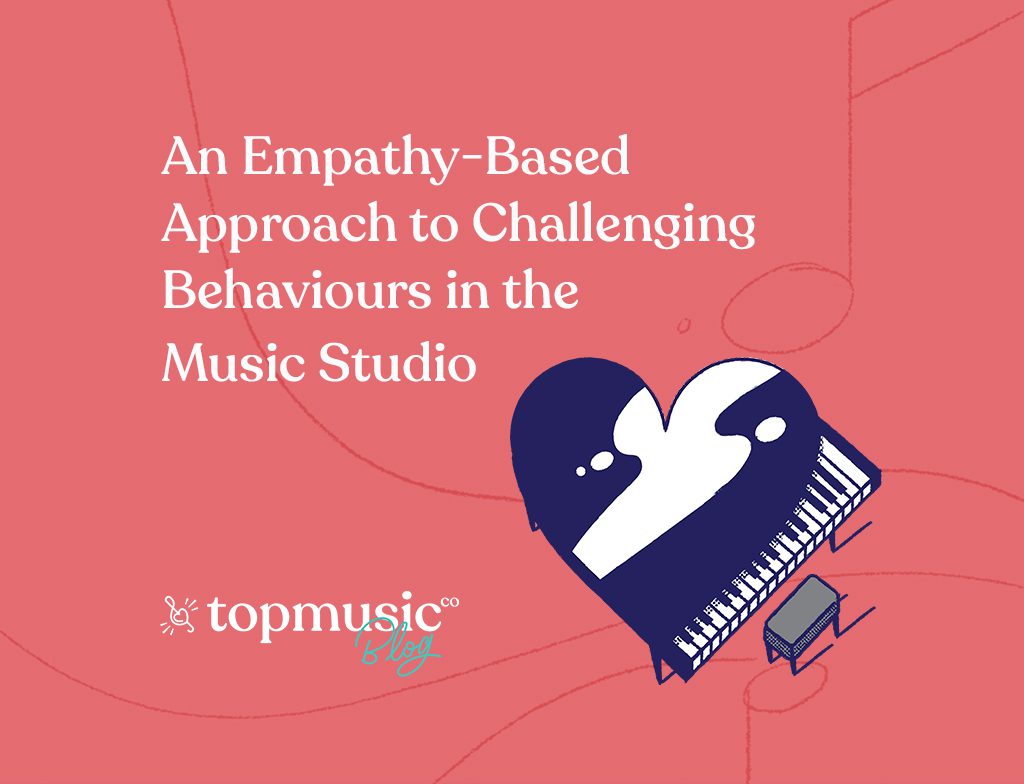What is a teacher to do in those ‘I’ve had it!’ moments
An Empathy-Based Approach to Challenging Behaviours in the Music Studio
The number one issue cited by teachers as causing them anxiety in their work is managing challenging behaviours in students. We’ve all had students that struggle to function within the behavioural parameters that we expect in a music lesson—paying attention, following instructions, working through frustration, and the list goes on.
So often I see teachers throw in the towel, believing that these students aren’t capable of participating in music lessons, or perhaps that the students are just rude, lazy, etc. (And if I really thought a student was just rude or lazy, I may have a hard time working with them too!)
However, I want to propose a different way of approaching this issue — one that presumes that “kids do well if they can,” as Dr Ross Greene, a clinical child psychologist, would say.
What if we adopt an approach that seeks to understand what’s happening with the student? We could understand what causes them to react in certain ways or struggle with some aspects of the music learning process. Then we could more easily provide the support they deserve.
The key to this approach is empathy, which is connecting with the student’s experience. We should understand that while the student’s behaviours may be causing us distress, that’s not the intention. There are lagging skills that inhibit the student from meeting the expectations that come with a typical music lesson. And they’re probably just as frustrated with it as you are.
Becoming curious about what’s going on and seeking to understand it will go a long way towards finding a solution that will reduce your frustration and lead to better learning outcomes for your student.
Human behaviour is complex. It’s not easy to discern what’s behind any challenging behaviours our students may be exhibiting. But working through the following steps with keen observation and an open mind will help get you there.
Are they intensely interested in something else in the room? Do they need to move? Are they feeling anxious about making mistakes? Remember that all behaviour is communication. See if you can figure out what your student is trying to tell you.
This goes back to the idea that “kids do well if they can.” Generally speaking, there is nothing wrong with the feeling or the need that underlies the behaviour. But it is the way it’s being expressed that is problematic. This is due to a lagging skill, and if you have a student with exceptionalities, there could be many of these. For example, the student may have difficulty managing their frustration or may have poor impulse control. Understand that while you can set certain boundaries in your classroom, these are part of your student’s profile that you won’t be able to change.
Remember that you can’t change the lagging skill, so you need to set reasonable goals and expectations to meet your student at their level. And the need or feeling is valid but is being expressed in a maladaptive way due to the lagging skill. So, your plan should meet the feeling or need while providing the support needed based on the lagging skills of the student.
Here’s an example that comes up a lot in music lessons.
Let’s say you have a student that has a hard time staying focussed at the instrument for the full lesson, even though your typical students at that age have no problem with it. This particular student gets up to grab things that look interesting on the shelf, is fidgety, maybe stops playing to talk about unrelated things (video games is one that comes to mind!).
If your expectation is that students that age should be able to focus and you don’t go any further than that, then of course you would feel frustrated.
But this student is telling you through their behaviours that their body and mind doesn’t allow them to stay focused.
An empathy-based approach sees that the student has a hard time staying focussed when there are so many other interesting things going on, and understands that the student can’t meet the current expectations — through no fault of their own.
An action plan for this student would include things like:
This empathetic approach has so many positive outcomes: the student feels understood, they are more engaged in the learning process, and there is less frustration for you!
Most of all, it allows them to continue with their music lessons in a way that will help them to grow not only in their musical abilities but to develop so many skills along the way.
Listen to my talk with Tim about how to have flexibility and compassion in your music lessons with students with exceptionalities.
